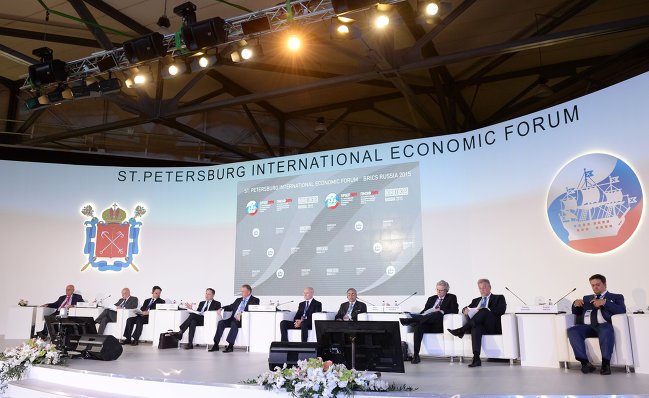
BRICS Business Forum held in St.Petersburg
A panel session of the BRICS Business Forum took place on the sidelines of the St.Petersburg International Economic Forum (SPIEF), which focused on cooperation in different areas.
The event was attended by First Deputy Minister of Economic Development of the Russian Federation Alexei Likhachev, IMF Executive Director Paulo Nogueira Batista, Secretary General of the Federation of Indian Chambers of Commerce and Industry Didar Singh, Vice Chairman of China Council for the Promotion of International Trade (CCPIT) Yu Ping and other representatives from the BRICS countries.
In his remarks, Mr Likhachev outlined the history of BRICS summits, stressing that one priority of Russia's BRICS Presidency is to develop The Strategy for BRICS Economic Partnership.
"The Strategy for BRICS Economic Partnership is a collective document in which all countries have an interest. It identifies areas of growth and designates targets and targeted sectors that will become our development priorities," he said, adding that the document could be approved at the next summit, in 2016.
Another important goal for the BRICS governments is the removal of barriers to trade in services and investment, he said.
Didar Singh pointed out that BRICS reflects the potential of the future. Concrete projects have already been proposed, specifically the BRICS New Development Bank. Bilateral cooperation between Russia and India is also developing rapidly, he said.
Yu Ping touched on the prospects for national entrepreneurial activity within the BRICS framework.
"BRICS is a very attractive organisation for China, and our business circles are placing high hopes on our cooperation. Our countries share a huge common market. We see expanding trade and huge potential in other areas," he said, adding that the BRICS countries should study each other's needs and capabilities. He also called for more priority to be given to the needs of small and medium-sized businesses at various dialogue platforms.
Paulo Nogueira Batista recalled that the BRICS countries were not entirely satisfied with the international financial architecture. As a result of this, they started creating new institutions, leading to an agreement to establish the BRICS New Development Bank and the Contingent Reserve Arrangement.
BRICS has achieved a new level of cooperation by creating these institutions, and they will naturally cooperate with the existing international organisations, he said, stressing that new financial institutions are committed to constructive work.
Representatives of big business also offered their vision of cooperation within the framework of BRICS. In particular, Dmitry Shugayev, deputy general director for foreign economic activity at the Rostech state corporation, said BRICS should develop multilateral projects with the participation of several countries. Such projects should be implemented in the raw materials and energy sectors, the helicopter manufacturing industry and other sectors.
"We are interested in developing relations that would help put in place a network of enterprises with joint multilateral participation," he said.
The session also discussed joint BRICS activities in professional personnel training, the unification of commodity classification, harmonising their approaches toward combatting counterfeit goods, enhancing the efficiency of oversight agencies and harmonising customs procedures, among others.